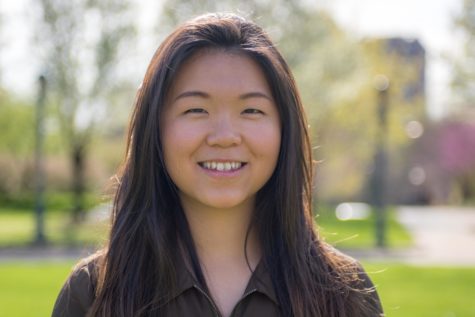Ashley Chan: Even at CWRU, change the value of the dollar
How is your spending impacting the world around you?
Walk into a store at the mall and you immediately notice: “Sale, Buy one get one, Deal of the week.” Without hesitation customers buy the products that appear to present a good purchase. The thrill of shopping contains the feeling of achievement when discovering a bargain, or fundamentally, the belief that the dollar is going further than what its value suggests.
Consumerism relies on sale tactics to maintain a profitable market. A grocer may be excited to see tomatoes on sale for 99 cents a pound, think that he or she is receiving more than what he or she is spending in the trade and purchase the item. Low prices act as a sanction for consumers to buy something without guilt. However the dollar spent in this case did not exceed its value.
What consumers often think of when purchasing an item is what the item will bring to them. What they often dismiss is where it came from. Groceries, clothing, etc. require human labor to be produced. In order to keep prices down, industry mass-produces its goods, thus marginalizing the workers’ wage and well-being. A low price is one that sells, but keeps working conditions poor.
As consumers we have tremendous power on the economy, industry and the lives of workers. Although many of us are college students with years of student loans ahead, we can take initiatives to ensure our dollar is used to its greatest potential value.
There is a relationship between increased wage for employees and increased pricing, but the effect on the company is negligible compared to the effect for the workers. Farmers, especially, often work in subhuman conditions for long hours just to receive a wage below the poverty line. Although many students are on Case Western Reserve University’s meal plan, groceries and other purchases can be made on products with a fair trade label, or a business that provides good working conditions for its employees.
As consumers we determine how we spend. It is easy to fall victim to a seemingly good sale and disregard the labor that contributed to such a low price. It is essential to combine our efforts to benefit the lives of other people through activism, volunteering and even something as small as purchasing a product of fair trade. Fair trade is not just a label that causes an increase in price, it is an initiative to improve the lives of the workers who make the product.
Ten Thousand Villages contributed to the globalization of the fair trade movement. It is a nonprofit organization and a quirky shop in Cleveland Heights that purchases its products from underprivileged artisans and craftsmen from developing countries. Its practice is sustainable and transparent. The middle man of the market is cut so the economic and environmental well-being of the producer is stable. I volunteered there during my orientation week, and was stunned to learn that much of the labor force relies on its volunteers. Volunteers allow Ten Thousand Villages to spend less on employment and more on poverty reduction for the artisans in developing countries.
The visit just a mile off-campus brought a new perspective to the importance of volunteering. Volunteering is not only about gaining new experiences, it is also about providing opportunity for other individuals to grow by reducing the organization’s cost of labor. The money that could’ve been used to hire employees is instead allocated for a higher purpose.
I encourage CWRU students to volunteer at a nonprofit organization and continue to explore the environment around them by not only venturing off-campus to learn about economic relationships, but also to be more aware about the legacy they are leaving through spending. The value of the dollar is dependent on where it goes after a transaction and whose lives it will affect.
Ashley Chan is a lost, undecided first-year who gravitates toward free samples. #frugalicious

Ashley Chan is a second-year student studying economics. Ashley likes to lift. If you wish to contact her, you can email her at axc627@case.edu.


